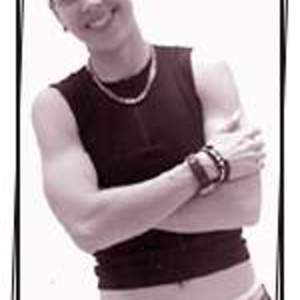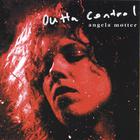Angela Motter

- Meta styles:
- Contemporary Folk, Singer/Songwriter
- Style:
- Contemporary Folk
At first glance, it's easy to call Angela Motter an enigma. A self-proclaimed "boy/girl" with a black-leather and muscle stage persona, Motter might be easily mistaken for a tough guy right out of 1955. Those alluring "Teen Beat pin-up girl, for girls" good looks, (-Jinny Hawkins, Acoustics Magazine) coupled with her unpretentious and oft-disarming stage presence, have won over legions of fans. With the 1999 release of Pleasure and Pain (produced by Motter and Ricky Keller of Tinsley Ellis, Bruce Hampton and Aquarium Rescue Unit fame) on her own Hey Mister! record label...
Pleasure and Pain combines influences as unique as the artist herself. Mixing the Delta blues ache of Robert Johnson with the swagger of James Dean and a heavy dash of Keller's sexy bass-slappin' and poppin' funk, Pleasure and Pain rocketed Motter to critical and popular acclaim - acclaim culminating in two 1999 Gay and Lesbian American Music Award (GLAMA) nominations. The "gender-bending soulster" (-GAYBC) and her band performed the song "isitaboyisitagirl" at the New York ceremony, offering the Big Apple crowd a taste of her studious guitar chops and her rich, smoky alto vocals. At the end of the night, Motter had picked up a win in the "Best Out Recording" category for the track "My Mama Told Me."
Clearly born a musician, Motter began writing songs at age 10. She began her recording career after earning a degree in Classical Guitar Performance from Georgia State University. Her pop-jazz song "Secret Lover" - from the compilation CD Best of the Jazz Flavours Cats IV (Primedia) - received heavy airplay in Atlanta and on the nationally syndicated "Jazz Flavours" radio show. After a gig opening for B.B. King, Motter decided to add the blues to her mix. Soon, she was experimenting with the slide guitar riffs that would become an integral part of her sound. Motter has since played alongside the Indigo Girls, Tuck & Patti, Louden Wainwright III, Southern Culture on the Skids, Canadian born ex-Nylons lead singer Barnes, Michelle Malone, and Melissa Ferrick.
"My songwriting wrestles with some weighty issues," Motter explained. "There's religion, the limitations imposed by the traditional South, gender variance and the death of loved ones. I guess you could say some of the lyrics are 'issue-oriented.' I tell folks my music combines funk-inspired rhythms and folk-inspired lyrics."
But Motter always tempers such heavy subject matter with her dry wit and trademark goofball humor. One thing she has always been serious about, however, is being open about her sexuality. She was the first out of the closet in the burgeoning Atlanta acoustic scene of the late 1980s. In the Gay Renaissance of the new millennium - where out is "cool" - Motter has utilized the Internet to reach an even greater queer audience. Her influence on gay youth in particular was never more apparent than during her performance at Atlanta Pride 2000. There, members of the city's YouthPride hung on her every word, screaming with a Backstreet Boys Fan Club intensity. For Motter, it was a moving experience.
"I think it's difficult for young dykes right now who identify as butch and perhaps are leaning towards identifying as transgendered to figure out how to deal with being a masculine female in a culture that doesn't really recognize anything other than the binary system of gender." she said. "I want them to know there is a place in the world for them to be themselves, all along the spectrum of gender variance."
Motter certainly knows how to be herself. That honesty is an integral part of the sacred and profane intensity of Pleasure and Pain, an album Motter believed in so fervently she was able to raise more than $23,000 from friends and fans to record it.
"I've experienced every single minute of my life through music," she maintains.
But music is not all she does. Motter mixes mountain biking, weightlifting, and meditation. If you're lucky, you'll catch her in Atlanta flexing her acting muscles - she even had a small role in the lesbian indie flick "Inn Trouble."
For now, Motter continues to tour the East Coast adding new cities regularly. A West Coast tour is slated for April 2001.
In the end, it all boils down to the dramatic way her music reaches people. "I get fan mail from people telling me I helped them have the courage to be more of themselves," Motter said. "They see how out and how easy-going I am. That's the greatest part of this. And I wouldn't trade those moments for anything in the world."
- Sort by

Outta Control
- Year:
- 2005
- Tracks:
- 9
- Bitrate:
- 176 kbps